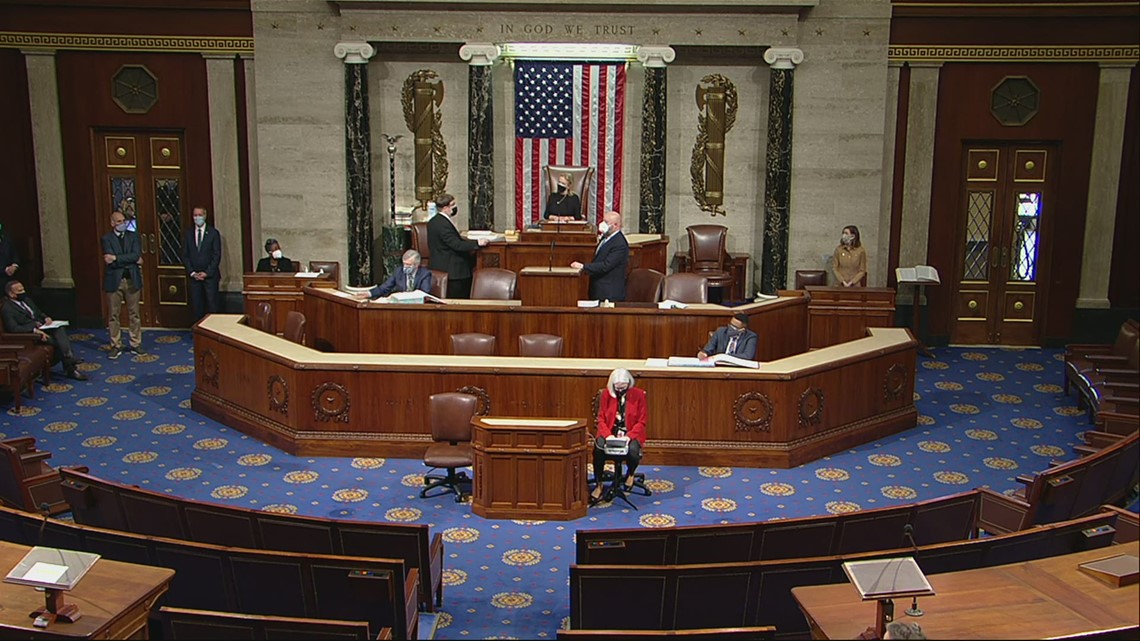WASHINGTON — On January 20, 2021, President Trump will add a title prefix "former" to his name. That new status has our Verify inbox filling up.
"I know a sitting president cannot be convicted for crimes while in office unless convicted during an impeachment trial," a viewer asked the Verify team by email.
"My question is, can a president be charged for crimes after they leave the office for crimes they committed while in office, for example, election fraud or inciting an insurrection? Could the current president face federal charges once he leaves office?"
To answer these questions, our Verify researchers looked at a variety of sources:
- Various Supreme Court cases
- Sai Prakash, professor of constitutional law at the University of Virginia
- Brian Kalt, professor of law at Michigan State University


Let's start here: It's still disputed amongst legal scholars whether or not a sitting president has immunity from being prosecuted.
"The main argument that the president can be prosecuted while he's in office is that there's nothing in the Constitution that says explicitly that he can't," Brian Kalt said.
Sai Prakash agreed.
"If you read the Constitution, there is no expressed privilege relating to those things," Prakash said. "That is to say there's nothing saying the president can't be prosecuted, punished, or indicted."
But there are several arguments against prosecuting a sitting president. For starters, who would have the power to bring a case against the commander-in-chief?
"One part of the argument is that the president is the embodiment of the executive branch, of the federal government, he is the government," Kalt said. "So if a state were to try to prosecute him, that would be a state sort of asserting its authority over the government in a way that federalism doesn't really allow for."
RELATED: VERIFY: If a president is impeached, will they lose benefits like security detail and pensions?
The same is true at the federal level, Kalt explained.
"The question is whether there's anyone else legitimately who could say, we are directing the power of the government against the person who's in charge of it," Kalt said. "We do have a declaration in the Constitution of who's supposed to do that the argument goes, and that is Congress. If there's a problem with something the president has done, then the House impeaches and the Senate can remove."
RELATED: VERIFY: If a president is impeached, will they lose benefits like security detail and pensions?
Another argument is that the president is just too important to be dealing with a lawsuit while he or she is trying to run the country.
"My view is, some of these things aren't really as problematic as some people suppose. Indicting a president really doesn't have any consequences, it's not an adjudication of guilt, it's just sort of beginning the criminal process," Prakash said.
He continued, "If you think the president can't be in jail and still be president, there's sort of two answers to that problem. One would be the vice president takes over...the other solution is just for Congress to provide that, by statute, no president can be indicted or prosecuted or punished."
As it stands, the question remains unanswered and there is no precedent.
Back to the main question, can a former president be prosecuted?
Our experts say yes.
"All of the serious arguments that the President is immune while in office are limited to while he's in office," Kalt said, continuing to explain why other cases in the past have worked the way they have.
"That's why President Nixon needed to be pardoned by President Ford if he wanted to avoid prosecution. And he was, and that's why President Clinton, a day before he left office, settled the case that the special prosecutor was ready to bring against him because once he was out of office, he wouldn't have that immunity anymore.”


Kalt explains it gets trickier if someone tries to prosecute a former president for something they did in their capacity as president. Prakash agreed.
"Everyone agrees that the president can be prosecuted after he leaves office for at least some acts that occurred before he left office, and obviously for acts that occurred after he leaves office," Prakash said. "The wrinkle is, can he be prosecuted for his official acts?"
Prakash says the Supreme Court never answered the question, but said "no one denies that he can be prosecuted for his private acts. If he shoots someone in his private capacity as president, or if he shot someone before he was president, they can prosecute him after he leaves office.”
So, could a sitting president be sued for a civil crime?
Again, that depends on whether it's for something done in the president's private or professional capacity, and there's a precedent for each.
When former Arkansas state employee Paula Corbin Jones sued President Clinton, she was suing him for alleged misconduct, in his personal and private capacity.
On the other hand, when A. Ernest Fitzgerald lost his job as an analyst for the Air Force and sued President Nixon, he was suing him in his professional, presidential capacity.
"So in Clinton versus Jones, President Clinton was being sued by Paula Jones and argued you can't sue the president while he's in office, and the Supreme Court said, 'yes, you can,'" Kalt said."At the same time, there's another case Nixon versus Fitzgerald, it says, you can't be sued as president...for any of your official acts."
Lots of crimes have statutes of limitations built into them. What would happen if the president was being charged for a crime he committed before being president, and the statute of limitation was four years?
That all depends on whether or not you believe that a sitting president is immune to prosecution.
Those who believe that a president can be prosecuted will argue that his/her time in the office would count towards the statute of limitations. While those who believe that the president cannot be prosecuted will say that the statute of limitations is paused.
"We don't have any precedent for any of this," Kalt said.
Could the president pardon themselves before leaving office?
No president has ever tried to do it, but there are arguments on both sides, and Kalt says he was one of the first to write about it back in the 1990s.
He argued against the legitimacy of self-pardoning.
"The textual argument is that the president has the power to grant pardons and granting something, that's something you do to someone else," Kalt said. "'Pardoning, if you look at the Latin roots of the word, it's the same root as the word donate. You can't make a donation to yourself. That wouldn't be a donation, it doesn't make sense to call that a donation."
Kalt explained the second argument comes from the principle that you can't preside over your own case.
"If you are dealing with criminal consequences, you don't get to be on the jury, you don't get to be the prosecutor, you don't get to be the judge. Someone else has to do that if the case is about you," Kalt said. "And so the argument would go similarly if you're the president, you have to wait until someone else is the president to decide whether you're worthy of a pardon or not."
The argument in favor of a self-pardon, Kalt explained, comes from the fact that nowhere in the Constitution does it say the president cannot pardon him or herself.
Do you have something you want our Verify researchers to look into? Send us an email at verify@wusa9.com


